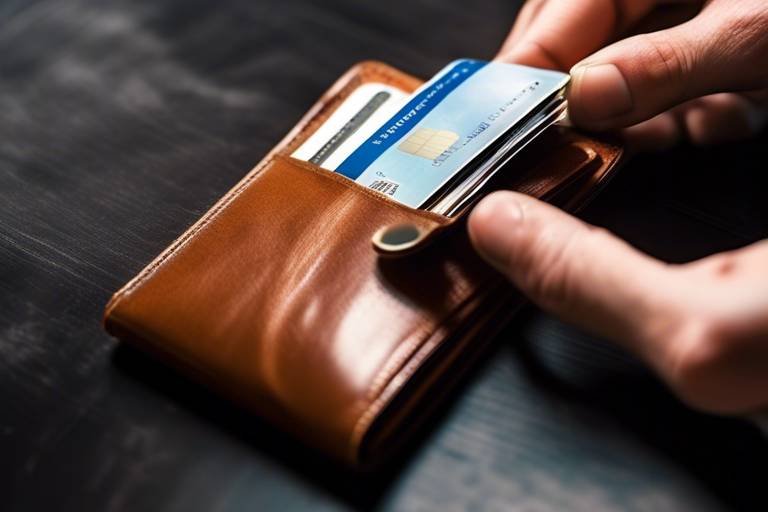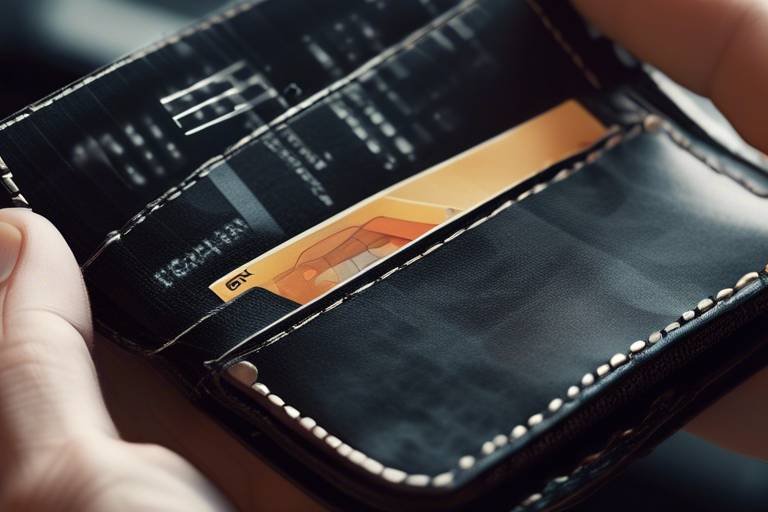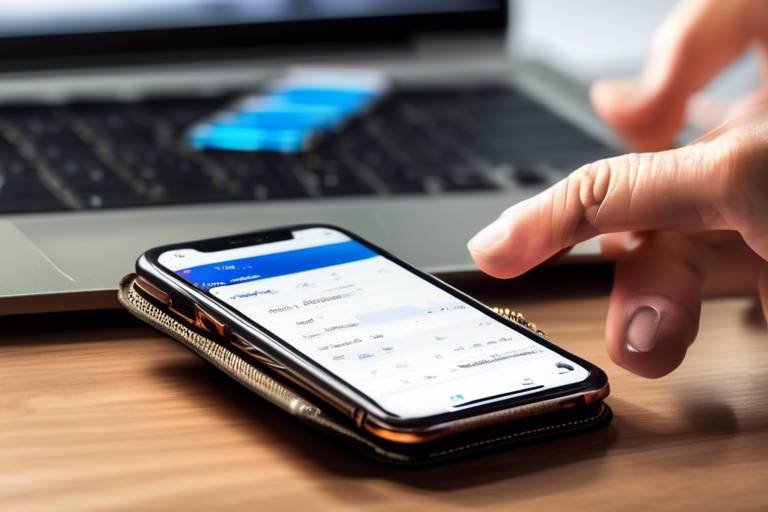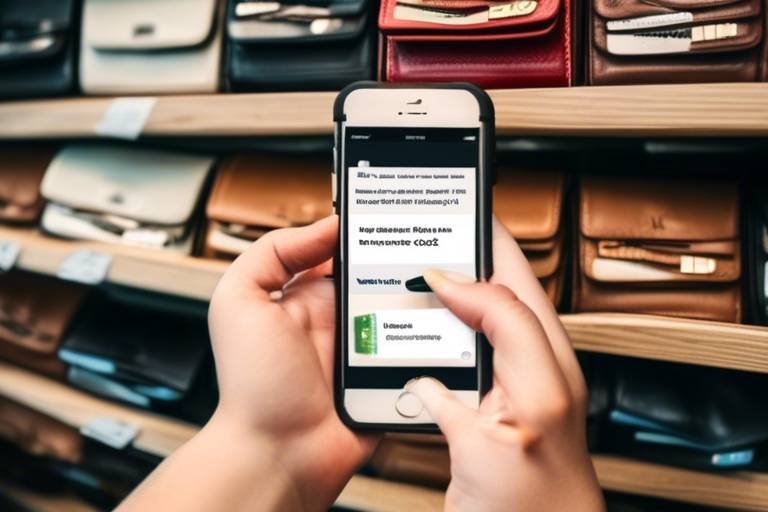How to Use Wallets for Travel and Tourism in Crypto
In today's fast-paced world, the way we travel is evolving, and so are our payment methods. With the rise of cryptocurrency, travelers are now exploring the exciting possibilities of using crypto wallets to manage their finances on the go. Imagine being able to pay for your hotel, meals, or even souvenirs with just a few taps on your smartphone, without the hassle of currency exchange or high transaction fees. This is not just a dream; it’s a reality for many savvy travelers who embrace digital currencies.
Using crypto wallets while traveling can significantly enhance your experience by providing greater financial flexibility. Whether you’re wandering through the streets of Tokyo or lounging on a beach in Bali, having a crypto wallet allows you to make instant payments and avoid the cumbersome processes associated with traditional banking. But how do you navigate this new terrain? From understanding the different types of wallets to implementing best practices for security, this guide will equip you with everything you need to know to make the most of your travel adventures with cryptocurrency.
As we dive deeper into this topic, we'll explore the various benefits of using crypto wallets, the types available, and how to choose the right one for your specific travel needs. Plus, we'll share essential security tips to keep your digital assets safe while you’re out exploring the world. So buckle up, because your journey into the world of crypto travel is about to begin!
Traveling with crypto wallets offers numerous advantages that can transform your travel experience. One of the standout benefits is enhanced security. Unlike carrying large amounts of cash or relying solely on credit cards, crypto wallets provide a secure way to store your funds digitally. This means you can avoid the risk of theft or loss that often comes with traditional wallets.
Another significant advantage is the reduction in transaction fees. When you use a crypto wallet, you often face lower fees compared to conventional banking methods, especially for international transactions. This can save you a considerable amount of money, allowing you to allocate those funds towards more experiences during your trip.
Lastly, the ability to make instant payments is a game changer. Imagine arriving at your destination, checking into your hotel, and paying for your stay with a quick scan of your phone. No more waiting in long lines or dealing with currency conversion. With crypto wallets, you can streamline your travel experience and focus on what really matters—making unforgettable memories!
Now that we’ve touched on the benefits, let’s familiarize ourselves with the various types of crypto wallets available to travelers. Each type has its unique features, making them suitable for different travel scenarios and security needs.
Hot wallets are a popular choice among travelers due to their convenience. They are connected to the internet, making it easy to access your funds anytime, anywhere. This is perfect for everyday travel expenses like dining out or purchasing tickets. However, this online nature also poses certain security risks, as hot wallets are more susceptible to hacking.
When selecting a hot wallet, it’s crucial to consider several key features:
- User Interface: Look for a wallet that is easy to navigate, especially if you're new to cryptocurrency.
- Security Measures: Ensure the wallet has robust security features, such as encryption and two-factor authentication.
- Supported Currencies: Check if the wallet supports the cryptocurrencies you plan to use during your travels.
To enhance the security of your hot wallet while traveling, implement best practices such as:
- Enabling two-factor authentication for an extra layer of protection.
- Regularly updating your wallet software to guard against vulnerabilities.
- Being cautious of public Wi-Fi networks; consider using a VPN to secure your connection.
If security is your top priority, cold wallets are the way to go. These wallets store your cryptocurrencies offline, providing the highest level of security against hacking and theft. While cold wallets are less convenient for everyday transactions, they are perfect for storing larger amounts of cryptocurrency that you don’t plan to use frequently.
Choosing the right wallet for your trip depends on several factors, including your travel plans, duration, and security needs. Consider your itinerary and spending habits to determine which wallet will best suit your needs.
Different destinations may have varying levels of crypto acceptance. Researching the local culture and understanding how widely accepted cryptocurrencies are can influence your decision on which wallet to use. For instance, if you're heading to a tech-savvy city, a hot wallet may be ideal. However, if you're exploring remote areas, a cold wallet might be safer.
Take the time to compare the features of different wallets. Look into transaction fees, user experience, and security protocols. This comparison will help you find a wallet that aligns with your travel requirements and personal preferences.
Prioritizing security while traveling with crypto is essential. Here are some practical tips to safeguard your wallet and digital assets:
- Always back up your wallet and keep your recovery phrases secure.
- Be cautious of phishing scams; never click on suspicious links.
- Consider using a hardware wallet for storing large amounts of cryptocurrency.
Q: Can I use cryptocurrency everywhere while traveling?
A: While acceptance is growing, not all places accept cryptocurrency. It's wise to have some local currency on hand as a backup.
Q: Are crypto wallets safe?
A: Yes, but safety largely depends on the type of wallet you choose and the security measures you implement.
Q: What should I do if I lose access to my wallet?
A: Always keep a secure backup of your wallet's recovery phrase. This will allow you to regain access to your funds.

The Benefits of Using Crypto Wallets While Traveling
Traveling is an adventure that opens up a world of experiences, but managing your finances on the go can be a bit of a hassle. This is where crypto wallets come into play, transforming the way we handle money while exploring new destinations. Imagine being able to pay for your hotel, meals, and even souvenirs with just a few taps on your phone, all while enjoying lower transaction fees and enhanced security. Sounds appealing, right?
One of the most significant advantages of using crypto wallets while traveling is the enhanced security they offer. Traditional methods of carrying cash or even credit cards can leave you vulnerable to theft or loss. With a crypto wallet, your funds are secured with advanced encryption, making it much harder for anyone to access your assets without your permission. Plus, you can easily backup your wallet, ensuring that even if your device is lost or stolen, your funds remain safe and accessible.
Another major benefit is the reduced transaction fees. When you use traditional banking systems, you often face hefty fees for currency conversion and international transactions. Crypto wallets can help you avoid these costs, allowing you to keep more of your money for the things that truly matter—like that unforgettable dinner overlooking the ocean or a spontaneous excursion to a hidden gem. By utilizing digital currencies, you can enjoy a more cost-effective travel experience.
Furthermore, the ability to make instant payments is a game changer. Imagine arriving at a bustling market, ready to haggle for that perfect piece of art, and being able to pay instantly without waiting for a card to process or worrying about local currency. With a crypto wallet, you can make transactions in real-time, making your travel experience smoother and more enjoyable. This immediacy can also help you avoid the stress of carrying large amounts of cash or searching for ATMs in unfamiliar places.
In addition to these benefits, using a crypto wallet can also enhance your financial flexibility. Many travelers find themselves in situations where they need to adapt their spending quickly. Whether it's an unexpected expense or a spontaneous adventure, having a crypto wallet allows you to access your funds from anywhere in the world, as long as you have an internet connection. This flexibility can give you peace of mind, knowing that your finances are just a click away.
In summary, embracing the world of cryptocurrency wallets while traveling can significantly enhance your journey. From improved security and reduced fees to instant payments and financial flexibility, the advantages are clear. As travel continues to evolve, being equipped with the right tools, like a reliable crypto wallet, can make all the difference in creating memorable experiences.

Types of Crypto Wallets for Travelers
When it comes to traveling with cryptocurrencies, understanding the different types of crypto wallets available can make a world of difference. Each wallet type serves a unique purpose and offers various features tailored to the needs of travelers. Whether you’re a digital nomad or a casual vacationer, knowing these options can help you make informed decisions about how to manage your digital assets on the go.
Broadly speaking, crypto wallets can be categorized into three main types: hot wallets, cold wallets, and hardware wallets. Each of these wallets has its own set of advantages and disadvantages, depending on your travel preferences and security needs.
Hot wallets are online wallets that allow for quick access to your funds. They are perfect for making everyday transactions, such as booking accommodations or dining out. However, the convenience of hot wallets comes with a trade-off: they are more susceptible to hacking and other online threats. Therefore, if you choose to use a hot wallet during your travels, it's crucial to take extra security precautions.
On the other hand, cold wallets store your cryptocurrencies offline, providing an added layer of security that is particularly beneficial for long-term storage. This means that cold wallets are less vulnerable to online attacks, making them a solid choice for travelers who want to keep their assets safe while exploring. However, the downside is that accessing your funds may take a bit more time, which can be inconvenient if you need to make quick transactions.
Then, we have hardware wallets, which are a hybrid between hot and cold wallets. They are physical devices that store your private keys offline while still allowing you to connect to the internet when necessary. This gives you the best of both worlds: enhanced security paired with the ability to perform transactions when needed. Hardware wallets are ideal for travelers who carry a significant amount of cryptocurrency and want to ensure its safety without sacrificing too much convenience.
To summarize, here’s a quick comparison of the three wallet types:
| Wallet Type | Security Level | Convenience | Best For |
|---|---|---|---|
| Hot Wallet | Low to Medium | High | Everyday transactions |
| Cold Wallet | High | Low | Long-term storage |
| Hardware Wallet | High | Medium | Travelers with significant assets |
Ultimately, the choice of wallet depends on your travel habits and how you intend to use your cryptocurrencies. If you plan on making frequent purchases, a hot wallet may be more suitable. However, if security is your top priority, consider opting for a cold or hardware wallet. Understanding these different wallet types can empower you to make decisions that enhance your travel experience while keeping your digital assets secure.

Hot Wallets: Convenience vs. Security
When it comes to traveling with cryptocurrencies, hot wallets are often the go-to choice for many globetrotters. Why, you ask? The answer lies in their remarkable convenience. Hot wallets are digital wallets that are connected to the internet, making it incredibly easy to access your funds anytime, anywhere. Imagine strolling through a bustling market in a foreign city and needing to make a quick purchase—having a hot wallet at your fingertips allows you to complete that transaction in seconds. However, this convenience comes with a trade-off, and it's crucial to weigh the risks involved.
While hot wallets provide seamless access to your digital assets, they are also more vulnerable to security threats. Since they are online, they can be susceptible to hacking, phishing scams, and other cyber threats. This is akin to leaving your front door wide open while you're on vacation; it might be easy to come and go, but it also invites unwanted guests. Therefore, understanding how to balance convenience with security is vital for any traveler utilizing hot wallets.
To help you navigate this landscape, let’s explore some of the key considerations when using hot wallets abroad:
- Accessibility: Hot wallets allow you to access your funds from any device with internet connectivity, making them perfect for spontaneous purchases.
- Transaction Speed: Transactions are generally processed quickly, which is essential when you’re on the move.
- Security Measures: While hot wallets are convenient, it’s important to implement strong security practices, such as using two-factor authentication and keeping your software updated.
When choosing a hot wallet for your travels, look for features that enhance security without sacrificing usability. For example, consider wallets that offer multi-signature support or those that allow you to set spending limits. These features can provide an extra layer of protection against unauthorized access.
In conclusion, hot wallets serve as a powerful tool for travelers who want to embrace the world of cryptocurrency. However, like any tool, they require careful handling. By understanding the balance between convenience and security, you can enjoy the benefits of hot wallets while minimizing the risks associated with them. So, whether you’re sipping espresso in a quaint café or exploring the vibrant streets of a new city, ensure that your digital assets are as secure as they are accessible.
Q1: Are hot wallets safe for travel?
A1: Hot wallets are generally safe for everyday transactions, but they do come with risks due to their online nature. It’s essential to implement security measures such as two-factor authentication.
Q2: Can I use hot wallets in all countries?
A2: Yes, hot wallets can be used globally, but the acceptance of cryptocurrencies may vary by country. Always check local regulations and merchant acceptance before traveling.
Q3: What should I do if my hot wallet is compromised?
A3: If you suspect that your hot wallet has been compromised, immediately transfer your funds to a secure wallet and change your passwords. Contact your wallet provider for further assistance.

Choosing the Right Hot Wallet
When it comes to selecting the right hot wallet for your travels, it's essential to consider several factors that align with your specific needs. Hot wallets are designed for convenience, allowing you to access your funds quickly and easily while you're on the go. However, not all hot wallets are created equal, and making an informed choice can significantly impact your travel experience.
First and foremost, user interface plays a crucial role in your decision. A wallet with a clean, intuitive design will make it easier for you to navigate and manage your funds, especially when you're in a hurry or dealing with unfamiliar currencies. Look for wallets that offer a seamless user experience, allowing you to send and receive payments without unnecessary complications.
Next, consider the security measures that the wallet provides. While hot wallets are inherently more vulnerable to online threats, some wallets come equipped with advanced security features like two-factor authentication and biometric login. These features add an extra layer of protection, making it harder for unauthorized users to access your funds. It's a good idea to choose a wallet that prioritizes security without sacrificing usability.
Another important aspect to evaluate is the supported currencies. Depending on your travel destination, you may need to transact in different cryptocurrencies. Ensure that the wallet you choose supports the currencies you plan to use. Some wallets offer a broad range of cryptocurrency options, while others may only support a few popular ones. A wallet that accommodates multiple currencies can save you the hassle of converting funds on the go.
| Feature | Importance |
|---|---|
| User Interface | Ensures ease of use and quick access to funds |
| Security Measures | Protects against unauthorized access and theft |
| Supported Currencies | Allows for transactions in various cryptocurrencies based on your travel needs |
Lastly, take into account the customer support provided by the wallet service. In the event of issues or questions, having access to responsive customer support can be invaluable. Look for wallets that offer 24/7 support through multiple channels, whether it be live chat, email, or phone. This ensures that you can get help whenever you need it, especially during your travels when you're likely to face unexpected challenges.
In summary, choosing the right hot wallet involves evaluating the user interface, security features, supported currencies, and customer support. By taking the time to research and compare different options, you can find a hot wallet that not only meets your needs but also enhances your travel experience. After all, the goal is to enjoy your journey without the stress of managing your digital assets!
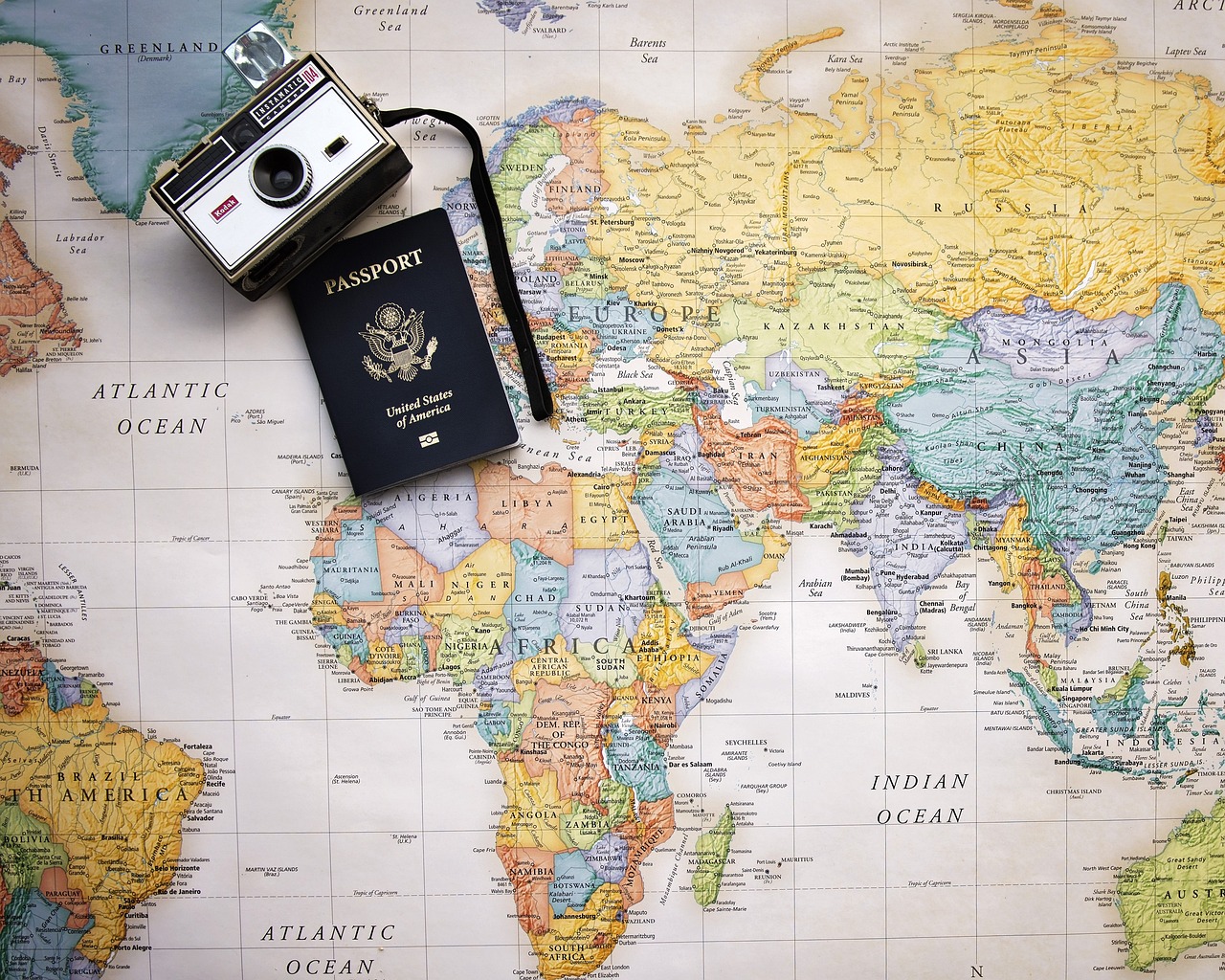
Best Practices for Using Hot Wallets
When it comes to using hot wallets while traveling, it’s essential to adopt some best practices to ensure your digital assets remain secure. Hot wallets, while incredibly convenient for making quick transactions, can also be vulnerable to cyber threats. To protect yourself, consider implementing the following strategies:
First and foremost, enable two-factor authentication (2FA). This adds an extra layer of security to your wallet by requiring not just your password but also a second form of identification, such as a code sent to your mobile device. It’s like having a second lock on your door; even if someone has your key (or password), they still can’t get in without that second lock.
Another vital practice is to keep your software updated. Wallet providers frequently release updates that patch security vulnerabilities. By ensuring your wallet app is always up to date, you’re minimizing the risk of exploitation by hackers. Think of it as regularly checking your smoke detectors; it’s a simple task that can save you from potential disaster.
Additionally, be cautious when using public Wi-Fi networks. While they are convenient, they can also be breeding grounds for hackers looking to intercept your data. If you must use public Wi-Fi, consider employing a Virtual Private Network (VPN) to encrypt your internet connection. This is akin to drawing the curtains in your house; it keeps prying eyes from seeing what’s inside.
Furthermore, always double-check the recipient's address before sending any funds. Cryptocurrency transactions are irreversible, and sending funds to the wrong address can lead to permanent loss. It’s wise to treat sending crypto like sending cash; once it’s gone, it’s gone for good.
Lastly, familiarize yourself with the wallet's security features. Many hot wallets offer additional options like biometric authentication or recovery phrases. Understanding how these features work can significantly enhance your security posture. Think of it as knowing the ins and outs of your car; the more you know, the better you can protect it.
By adopting these best practices, you can enjoy the convenience of hot wallets while minimizing the risks associated with them. Remember, security is an ongoing process, and staying informed is your best defense.
- What is a hot wallet? A hot wallet is a type of cryptocurrency wallet that is connected to the internet, allowing for quick and easy access to your digital assets.
- Are hot wallets safe for travel? While hot wallets are convenient for travel, they do come with security risks. Implementing best practices can help mitigate these risks.
- How can I enhance the security of my hot wallet? Enable two-factor authentication, keep your software updated, and avoid using public Wi-Fi without a VPN.
- What should I do if I lose access to my hot wallet? Most wallets provide recovery options, such as recovery phrases. Ensure you have these saved securely.
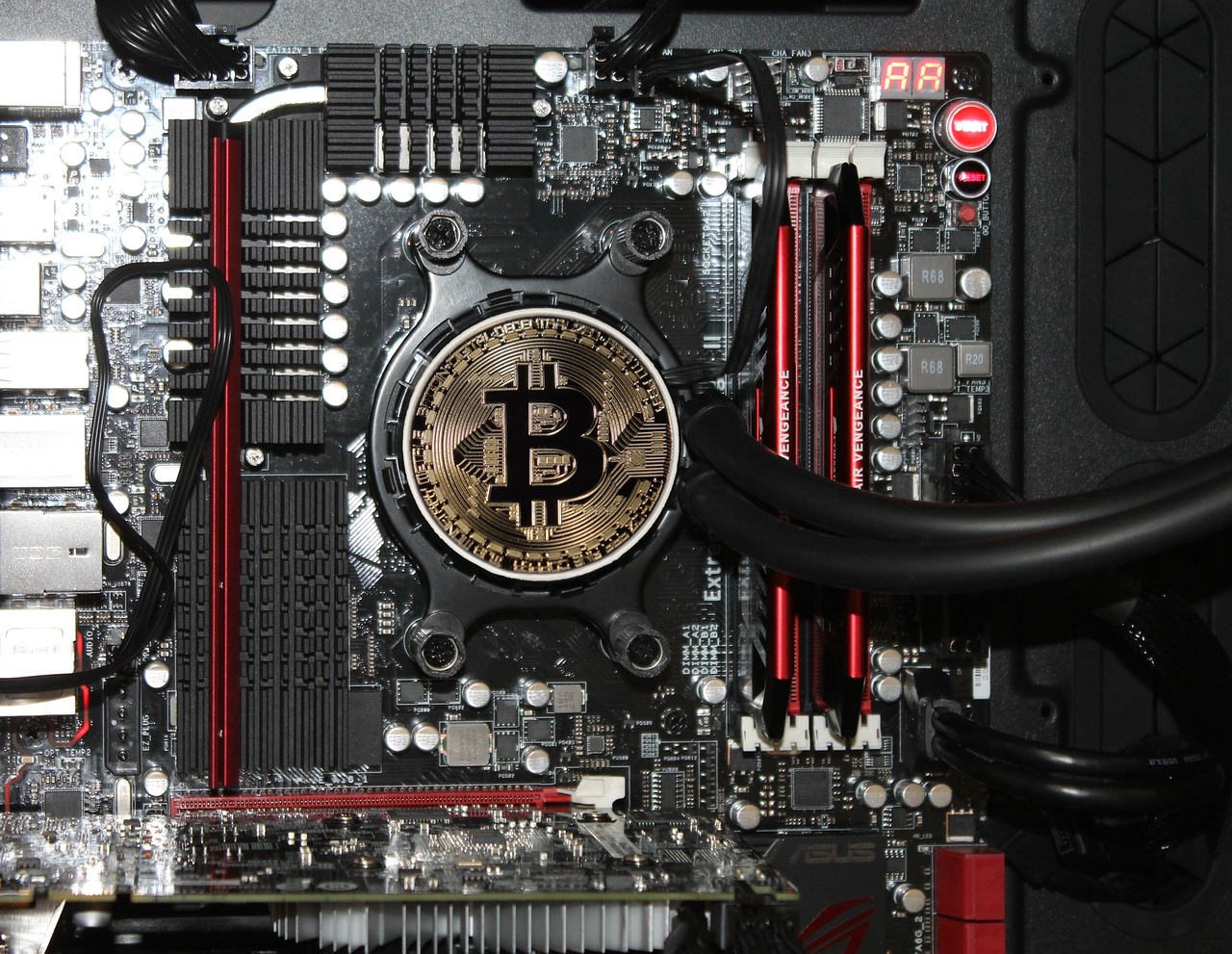
Cold Wallets: The Ultimate Security Option
When it comes to safeguarding your cryptocurrencies during travel, cold wallets emerge as the ultimate champion. Unlike hot wallets, which are connected to the internet and thus vulnerable to hacking, cold wallets store your digital assets offline, providing a fortress-like security. Imagine a bank vault for your crypto—this is what cold wallets represent. They are ideal for travelers who prioritize security over convenience, especially when visiting regions where the risk of theft or fraud is heightened.
Cold wallets come in various forms, including hardware wallets and paper wallets. Hardware wallets, such as Ledger or Trezor, are portable devices that securely store your private keys offline. On the other hand, a paper wallet involves printing your private and public keys on paper, which can be stored in a safe place. While both options have their pros and cons, they share a common goal: to keep your cryptocurrencies safe from prying eyes.
One of the significant advantages of cold wallets is their immunity to online threats. Since they are not connected to the internet, hackers cannot access your funds remotely. This feature is particularly beneficial when you are traveling in unfamiliar territories where cybercrime is rampant. However, it’s essential to remember that while cold wallets provide excellent security, they may not be as convenient for quick transactions. If you need to make a purchase or payment on the go, accessing your cold wallet can take extra time and effort.
Here are some key points to consider when using cold wallets during your travels:
- Accessibility: Ensure you can easily access your cold wallet when needed. If using a hardware wallet, familiarize yourself with its features before your trip.
- Backup: Always have a backup of your wallet’s recovery phrase stored securely. This will allow you to recover your funds if your wallet is lost or damaged.
- Secure Storage: Keep your cold wallet in a safe place, such as a hotel safe or a secure travel pouch, to prevent loss or theft.
In summary, cold wallets are the go-to solution for travelers who value security above all else. While they may not offer the same level of convenience as hot wallets, the peace of mind they provide is invaluable when navigating the unpredictable world of travel. By understanding how to effectively use cold wallets, you can travel with confidence, knowing your digital assets are well-protected.
1. What is a cold wallet?
A cold wallet is a type of cryptocurrency wallet that stores your digital assets offline, providing enhanced security against online threats.
2. How do I access my cold wallet while traveling?
You can access your cold wallet by using a hardware wallet device or by entering your recovery phrase if you are using a paper wallet. Always ensure you know how to access it before your trip.
3. Are cold wallets completely safe?
While cold wallets offer a high level of security, they are not immune to physical theft or loss. It's crucial to store them securely and have a backup of your recovery phrase.
4. Can I use a cold wallet for everyday transactions?
Cold wallets are not typically used for everyday transactions due to their offline nature. They are best suited for long-term storage of cryptocurrencies.
5. What should I do if I lose my cold wallet?
If you lose your cold wallet, you can recover your funds using the recovery phrase you backed up. Ensure that this phrase is kept in a secure location separate from your wallet.

How to Choose the Right Wallet for Your Trip
Choosing the right crypto wallet for your travel adventures is like picking the perfect suitcase; it needs to fit your journey's needs while keeping your valuables secure. First, consider your travel plans. Are you going on a short weekend getaway or an extended backpacking trip? The duration of your travels can significantly influence your wallet choice. If you're planning to stay in places where cryptocurrencies are widely accepted, a hot wallet may be your best bet for convenience and quick access to funds. However, if your travels take you to regions where crypto is less common, you might want to consider a cold wallet for added security.
Next, think about your spending habits. Are you a spontaneous spender who loves to explore local markets, or do you prefer to stick to a budget? Understanding how you plan to use your crypto while traveling will help you decide which wallet suits you best. For example, if you anticipate making frequent transactions, a hot wallet can provide the flexibility you need to make instant payments without hassle. On the other hand, if you plan to hold your crypto for the long term, a cold wallet may offer peace of mind by keeping your assets offline and away from potential cyber threats.
Another important factor is the accessibility of your chosen wallet. Some wallets are more user-friendly than others, and you’ll want to ensure you can navigate it easily, especially in a foreign country where language barriers might complicate things. Look for wallets that offer a straightforward interface and robust customer support, so you can get assistance if needed. Additionally, consider the types of cryptocurrencies you plan to use. Not all wallets support every currency, so make sure your wallet of choice can handle the coins you intend to spend.
To help you visualize the decision-making process, here’s a simple comparison table of wallet types based on key features:
| Wallet Type | Security Level | Accessibility | Best For |
|---|---|---|---|
| Hot Wallet | Medium | High | Frequent Transactions |
| Cold Wallet | High | Low | Long-Term Storage |
| Hardware Wallet | Very High | Medium | Highly Secure Transactions |
Ultimately, the right wallet for your trip will depend on a combination of these factors. By assessing your travel needs, spending habits, and the level of security you desire, you can make an informed choice that aligns perfectly with your journey. Remember, it’s not just about having a wallet; it’s about having the right wallet that complements your travel experience, ensuring that your crypto assets are safe while you explore the world.
1. What is the difference between hot and cold wallets?
Hot wallets are connected to the internet and allow for quick transactions, making them convenient for day-to-day use. Cold wallets, on the other hand, store your cryptocurrencies offline, providing a higher level of security against hacks and cyber threats.
2. How do I ensure my wallet is secure while traveling?
To keep your wallet secure, enable two-factor authentication, use strong passwords, and keep your software updated. Additionally, avoid using public Wi-Fi networks when accessing your wallet to reduce the risk of unauthorized access.
3. Can I use multiple wallets while traveling?
Absolutely! Many travelers use a combination of wallets, such as a hot wallet for everyday expenses and a cold wallet for long-term storage. This strategy can help you balance convenience with security.
4. What should I do if I lose my wallet?
If you lose your wallet, act quickly. If it's a hot wallet, you may be able to recover your funds using a recovery phrase or seed phrase. For cold wallets, ensure you have backup copies of your recovery information stored securely in a different location.

Assessing Your Travel Needs
When it comes to choosing the right cryptocurrency wallet for your travels, the first step is to assess your travel needs. Think about where you're going, how long you'll be there, and what you plan to do. Are you visiting a country with a thriving crypto ecosystem, or are you heading to a place where traditional currencies reign supreme? Understanding these factors will help you determine which wallet is most suitable for your journey.
Start by evaluating your itinerary. If you're traveling to popular tourist destinations that are known for their acceptance of cryptocurrencies, such as some cities in Europe or Asia, a hot wallet might be your best bet. These wallets allow for quick and easy transactions, making it simple to pay for meals, accommodations, and activities without the hassle of currency exchange. On the other hand, if you're heading to a remote location where crypto isn't widely accepted, you might want to consider a cold wallet to keep your assets secure while you navigate through cash-only transactions.
Next, consider your spending habits. Are you the type of traveler who enjoys dining at fancy restaurants and booking luxury accommodations, or do you prefer budget-friendly options? This can influence how much cryptocurrency you’ll need. If you plan to use crypto for major expenses, ensure your wallet supports the necessary currencies and has low transaction fees. Additionally, think about how often you'll need to access your funds. If you're constantly on the move, a hot wallet can provide the convenience you need, but remember the trade-off in security.
Another crucial aspect to consider is the level of crypto acceptance at your destination. Research local businesses and services to see if they accept digital currencies. Some countries have embraced cryptocurrencies, while others are still hesitant. If you find that crypto is not widely accepted where you're going, you may want to carry a mix of crypto and fiat currency. This way, you can use your wallet for online transactions while still having cash on hand for places that don’t accept digital payments.
Finally, take into account your personal preferences and comfort level with technology. If you're not particularly tech-savvy, a user-friendly wallet with a straightforward interface will make your travel experience much smoother. Look for wallets that offer good customer support and easy-to-follow instructions. You don’t want to be fumbling with your wallet while trying to enjoy your trip!
In summary, assessing your travel needs involves considering your itinerary, spending habits, the level of crypto acceptance at your destination, and your personal preferences. By taking the time to evaluate these factors, you can select a crypto wallet that not only meets your security needs but also enhances your overall travel experience.
- What is the best type of wallet for international travel? Hot wallets are generally the best for convenience, while cold wallets offer enhanced security. It depends on your travel scenario.
- Are there any fees associated with using crypto wallets while traveling? Yes, transaction fees can vary based on the wallet you choose and the network congestion at the time of your transaction.
- How can I ensure my crypto assets are safe while traveling? Enable two-factor authentication, use a secure internet connection, and regularly update your wallet software to enhance security.

Comparing Wallet Features
When it comes to choosing a crypto wallet for your travels, it's crucial to compare wallet features to ensure you pick the right one for your needs. Not all wallets are created equal, and understanding the differences can save you from potential headaches while you're on the road. Start by evaluating the transaction fees, which can vary significantly between wallets. Some wallets charge a flat fee, while others may take a percentage of your transaction amount. This difference can add up, especially when you're making several transactions during your trip.
Next, consider the user experience. A wallet with a complicated interface can lead to mistakes and frustration, particularly when you're trying to make a quick payment. Look for wallets that offer intuitive designs and straightforward navigation. Additionally, check if the wallet supports the cryptocurrencies you plan to use. Not all wallets support every digital currency, so it's essential to ensure that your preferred coins are available.
Security protocols are another critical feature to compare. Some wallets offer advanced security measures such as multi-signature authentication, while others may only provide basic password protection. It's wise to choose a wallet that offers robust security features, especially when you're dealing with your hard-earned digital assets. You might also want to look into how often the wallet provider updates its software, as regular updates can help protect against vulnerabilities.
To help you visualize these differences, here's a quick comparison table:
| Wallet Type | Transaction Fees | User Experience | Supported Currencies | Security Features |
|---|---|---|---|---|
| Hot Wallet | Low to Medium | High | Varies | Basic Security |
| Cold Wallet | Low | Medium | Varies | High Security |
| Hardware Wallet | Medium | Medium to High | Many | Very High Security |
By weighing these features, you can find a wallet that not only meets your immediate needs but also provides peace of mind during your travels. Remember, the right wallet can make your journey smoother and more enjoyable, allowing you to focus on exploring new places rather than worrying about your finances.
- What is a crypto wallet? A crypto wallet is a digital tool that allows you to store, send, and receive cryptocurrencies securely.
- Are hot wallets safe for travel? While hot wallets are convenient, they are more vulnerable to hacking. It's essential to implement security measures like two-factor authentication.
- How do I choose the right wallet for my needs? Assess your travel habits, the cryptocurrencies you plan to use, and the level of security you require to make an informed decision.
- Can I use multiple wallets while traveling? Yes, using multiple wallets can provide flexibility and security, allowing you to manage different currencies and transaction types more effectively.

Staying Safe: Security Tips for Crypto Travelers
When it comes to traveling with cryptocurrency, safety should be your top priority. Just like you wouldn’t walk through a crowded market with your wallet wide open, you need to ensure your digital assets are protected. Here are some essential tips to keep your crypto safe while you explore the world:
First and foremost, always enable two-factor authentication (2FA) on your crypto wallets. This adds an extra layer of security by requiring not just your password but also a second form of verification, like a text message or an authentication app. It’s like having a lock on your front door and a security system in place—double the protection!
Next, be cautious about using public Wi-Fi networks. They might be convenient, but they can also be a hacker's playground. If you need to access your wallet while on the go, consider using a VPN (Virtual Private Network) to encrypt your internet connection. This way, even if someone tries to intercept your data, they’ll be met with a wall of encryption that’s almost impossible to breach.
Another critical point is to keep your software updated. Whether it’s your wallet app or your device’s operating system, updates often include important security patches that can protect you from vulnerabilities. Think of it as regularly changing the locks on your doors; it keeps intruders at bay.
Additionally, consider using a hardware wallet for storing larger amounts of cryptocurrency. These devices store your assets offline, making them much harder to hack. You wouldn’t leave your cash lying around in your hotel room, so why would you keep large sums of crypto on a hot wallet? A hardware wallet is like a safe deposit box in a bank—secure and reliable.
When traveling, it’s also wise to have a backup plan. Write down your wallet recovery phrases and keep them in a secure location, separate from your devices. This way, if something goes wrong, you won’t be left in the lurch. It’s akin to having a spare key hidden away; you’ll be grateful for it when you need it.
Finally, always stay informed about the local regulations regarding cryptocurrency in the countries you’re visiting. Some places have restrictions or specific laws that could affect how you use your digital assets. It’s like knowing the traffic rules before hitting the road—nobody wants to get pulled over for a misunderstanding!
In summary, traveling with cryptocurrency can be an exciting adventure, but it comes with its own set of challenges. By implementing these security tips, you can enjoy the benefits of digital currencies while minimizing risks. Remember, being proactive about your security is the best way to ensure a smooth travel experience.
Q: What should I do if my crypto wallet is compromised?
A: If you suspect that your wallet has been compromised, immediately transfer your assets to a secure wallet. Change your passwords and enable 2FA if you haven't already. Contact your wallet provider for further assistance.
Q: Can I use cryptocurrency everywhere while traveling?
A: While cryptocurrency acceptance is growing, it’s not universal. Research ahead of time to see which places accept crypto and consider carrying some local currency for areas that don’t.
Q: Are there any risks associated with using public Wi-Fi for crypto transactions?
A: Yes, public Wi-Fi is generally less secure and can expose you to hacking attempts. Always use a VPN when accessing your wallet on public networks.
Q: How can I keep track of my crypto expenses while traveling?
A: Consider using crypto expense tracking apps that can help you monitor your spending and manage your assets efficiently while on the go.
Frequently Asked Questions
- What is a crypto wallet and how does it work?
A crypto wallet is a digital tool that allows you to store, send, and receive cryptocurrencies. It works by generating a pair of cryptographic keys: a public key that acts like your bank account number and a private key that is akin to your password. Keeping your private key secure is crucial, as anyone with access to it can control your funds.
- What are the benefits of using a crypto wallet while traveling?
Using a crypto wallet while traveling offers several advantages, including enhanced security, lower transaction fees, and the ability to make instant payments. It can also provide financial flexibility, allowing you to convert your crypto into local currency when needed, without the hassles of traditional banking.
- What types of crypto wallets are available for travelers?
There are three main types of crypto wallets: hot wallets, cold wallets, and hardware wallets. Hot wallets are internet-connected and ideal for everyday transactions, while cold wallets store your crypto offline for maximum security. Hardware wallets are physical devices that offer a balance between convenience and security, making them suitable for travelers.
- How do I choose the right wallet for my trip?
Choosing the right wallet depends on your travel plans, duration, and security needs. Consider factors such as accessibility, supported currencies, and the level of security you require. If you're visiting places with high crypto adoption, a hot wallet might be suitable; otherwise, a cold wallet could be a safer choice.
- What security tips should I follow when using a crypto wallet while traveling?
To keep your crypto safe while traveling, enable two-factor authentication on your wallet, regularly update your software, and avoid using public Wi-Fi for transactions. Additionally, keep your private keys secure and consider using a cold wallet for larger amounts of crypto that you don’t need immediate access to.
- Can I use crypto wallets in any country?
While crypto adoption is growing globally, acceptance can vary by country. Before traveling, research the local regulations and the availability of crypto-friendly businesses. In some places, you may find it easy to use crypto, while in others, traditional currencies may still dominate.
- What should I do if I lose access to my crypto wallet?
If you lose access to your crypto wallet, recovery depends on the type of wallet you are using. Most wallets provide a recovery phrase or seed phrase that can help you regain access. Always keep this phrase secure and backed up in a safe place. If you lose it, recovering your funds may be impossible.


